BIOLOGY MISC
Stem Early College
All 14 results
Sort by
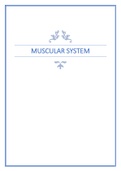
-
BIOLOGY MISC 3 Muscular System Complete Study Guide_ Guaranteed Success.
- Other • 30 pages • 2023
-
- $10.49
- + learn more
Muscular system - Muscle cells are found in every organ in the body and participate in every activity that requires movement. Together, they constitute nearly half of our body mass. The most obvious are the skeletal muscles that attach to the skeleton and give us strength and mobility. There are 3 types of muscles in our body: 1. Skeletal muscles: sculpt the body and contribute to our sense of attractiveness and well-being. Some of the smallest skeletal muscles control the focus of our ...
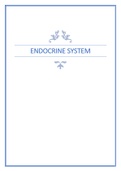
-
BIOLOGY MISC 4. Endocrine system Complete Study Guide_ Guaranteed Success.
- Exam (elaborations) • 34 pages • 2023
-
- $9.49
- + learn more
Endocrine system - An animal hormone is a chemical signal that is secreted into the extracellular fluid, circulates in the blood or hemolymph, and communicates regulatory messages within the body. ○ A hormone may reach all parts of the body, but only specific target cells have the receptors that enable a response. ○ A given hormone traveling in the bloodstream elicits specific responses— such as a change in metabolism—only from its target cells while other cells are unaffected. ...

-
BIOLOGY MISC 2. Skeletal System/Skeletal system The skeletal system consists of connective tissue Complete Study Guide_ Guaranteed Success.
- Exam (elaborations) • 33 pages • 2023
-
- $9.49
- + learn more
The skeletal system comprises three types of connective tissue—bones, ligaments, and cartilage. • Bones are the hard elements of the skeleton with which we are most familiar. • Ligaments consist of dense fibrous connective tissue—they bind the bones to each other. • Cartilage is a specialized connective tissue consisting primarily of fibers of collagen and elastic in a gel-like fluid called ground substance. Cartilage has several functions, including reducing friction in joint...

-
BIOLOGY MISC 7. Circulatory system
- Exam (elaborations) • 31 pages • 2023
-
- $10.49
- + learn more
Mammalian Circulation Let’s first examine the overall organization of the mammalian cardiovascular system, beginning with the pulmonary circuit. 1. Contraction of the right ventricle pumps blood to the lungs via the 2. pulmonary arteries. As the blood flows through 3. capillary beds in the left and right lungs, it loads O2 and unloads CO2. Oxygen-rich blood returns from the lungs via the pulmonary veins to the 4. left atrium of the heart. Next, the oxygen-rich blood flows into ...

-
BIOLOGY MISC Urinary system Complete Study Guide_ Guaranteed Success.
- Exam (elaborations) • 25 pages • 2023
-
- $9.49
- + learn more
Concept and importance of excretion: All biological processes that occur in the bodies of all living organisms are carried out through chemical reactions that leave some waste products. The living organism must get rid of these waste products as soon as they are formed, otherwise it will cause many problems and infections. - Excretion: the process by which the living organisms get rid of these waste products. Excretion in Animals Excretion refers to the materials that leave the body throu...
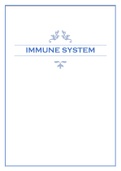
-
BIOLOGY MISC Immune System Complete Study Guide_ Guaranteed Success.
- Exam (elaborations) • 40 pages • 2023
-
- $9.49
- + learn more
The parts of the immune system are scattered, means its parts are not linked to each other in anatomical succession as that in digestive system, respiratory system or circulatory system, it consists of different parts throughout the body, but they interact and cooperate with each other in a coordinated manner. The Lymphoid organs These organs contain large numbers of lymphocytes where maturation and differentiation of lymphocytes take place, from these organs: 1. Bone marrow It is a tiss...
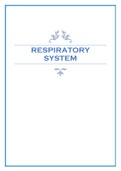
-
BIOLOGY MISC 8. Respiratory system
- Exam (elaborations) • 12 pages • 2023
-
- $9.49
- + learn more
In mammals, a system of branching ducts conveys air to the lungs, which are located in the thoracic cavity. • Air enters through the nostrils and is then filtered by hairs, warmed, humidified, and sampled for odors as it flows through a maze of spaces in the nasal cavity. • The nasal cavity leads to the pharynx, an intersection where the paths for air and food cross. When food is swallowed, the larynx (the upper part of the respiratory tract) moves upward and tips the epiglottis over ...
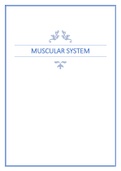
-
Muscular system
- Other • 30 pages • 2023
-
- $9.49
- + learn more
- Muscle cells are found in every organ in the body and participate in every activity that requires movement. Together, they constitute nearly half of our body mass. The most obvious are the skeletal muscles that attach to the skeleton and give us strength and mobility. There are 3 types of muscles in our body: 1. Skeletal muscles: sculpt the body and contribute to our sense of attractiveness and well-being. Some of the smallest skeletal muscles control the focus of our eyes; some of the...

-
Skeletal system The skeletal system consists of connective tissue>Complete Study Guide_ Guaranteed Success.
- Case • 33 pages • 2023
-
- $9.49
- + learn more
The skeletal system consists of connective tissue - The skeletal system comprises three types of connective tissue—bones, ligaments, and cartilage. • Bones are the hard elements of the skeleton with which we are most familiar. • Ligaments consist of dense fibrous connective tissue—they bind the bones to each other. • Cartilage is a specialized connective tissue consisting primarily of fibers of collagen and elastic in a gel-like fluid called ground substance. Cartilage has sev...
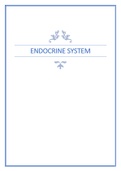
-
Endocrine system Complete Exam Study Guide_ Guaranteed Success 2023 latest
- Exam (elaborations) • 34 pages • 2023
-
- $9.49
- + learn more
Endocrine system - An animal hormone is a chemical signal that is secreted into the extracellular fluid, circulates in the blood or hemolymph, and communicates regulatory messages within the body. ○ A hormone may reach all parts of the body, but only specific target cells have the receptors that enable a response. ○ A given hormone traveling in the bloodstream elicits specific responses— such as a change in metabolism—only from its target cells while other cells are unaffected. ...

Study stress? For sellers on Stuvia, these are actually golden times. KA-CHING! Earn from your study resources too and start uploading now. Discover all about earning on Stuvia


